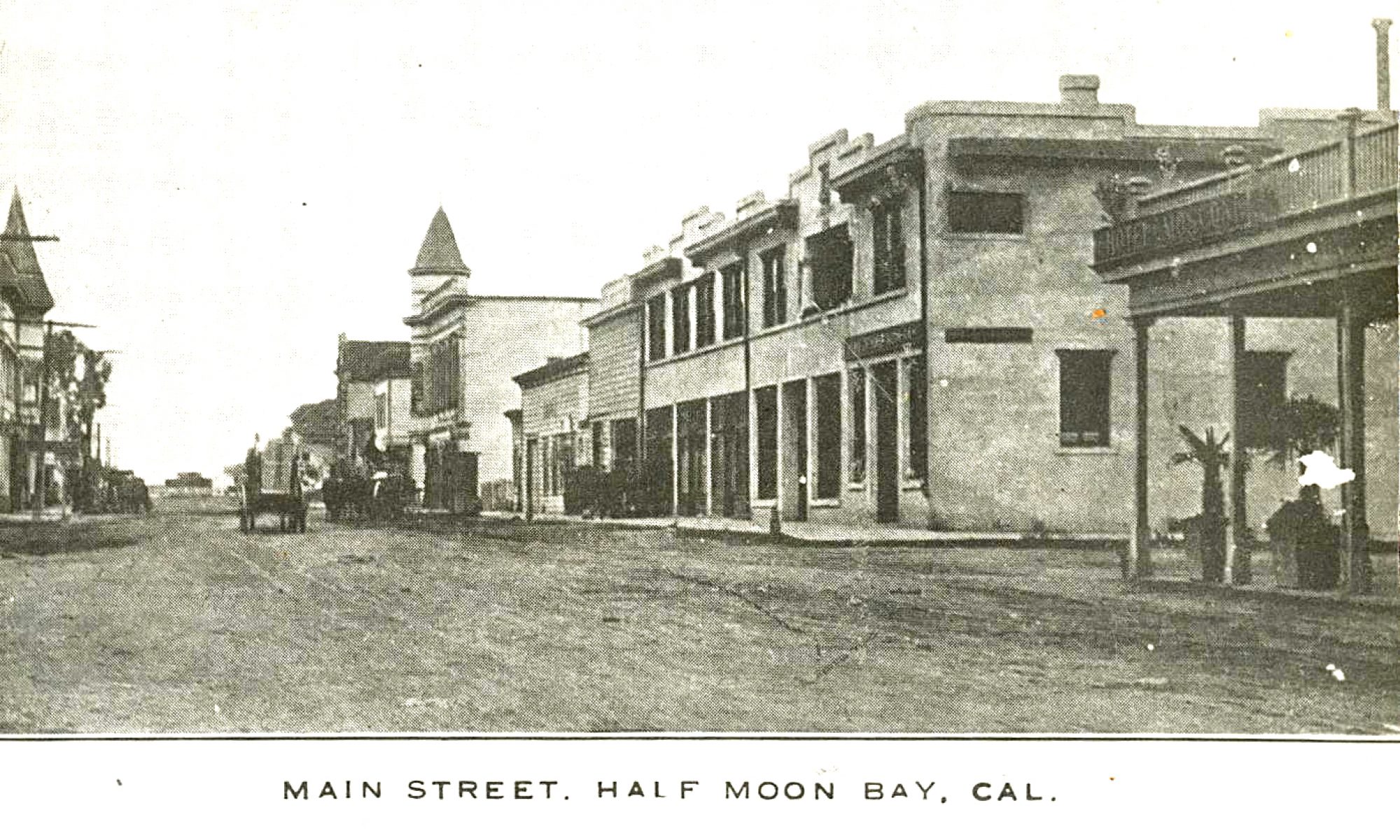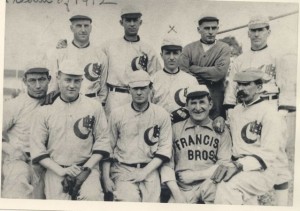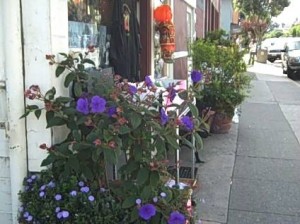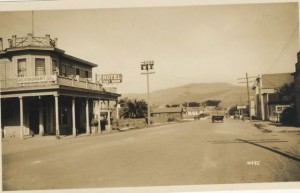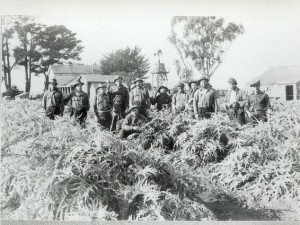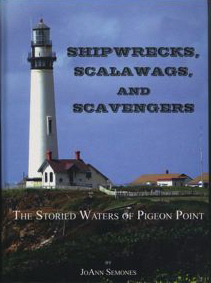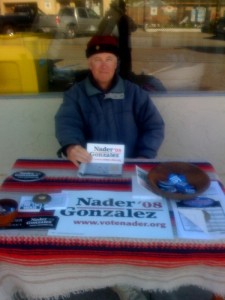Main Street Back Then: Hitching Posts Today: Flowers
Land of Farmers…Elaine Martini Teixeira Worked for the Farm Advisor’s Office
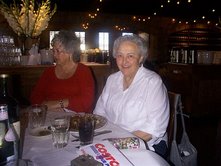 You asked me about working in the Farm Advisor’s office.
You asked me about working in the Farm Advisor’s office.
After I graduated from high school and briefly attended UC and then Heald’s Business College, I received a call from a former HMB High School Business teacher, Mrs. Marie Colwell, asking me if I cared to take a job in HMB. Because of family circumstances, one was my father had recently died in a truck accident, I accepted the job in the fall of 1949. The organization was a Federal agricultural agency, called Triple A, and was housed on Kelly Ave., across from the alley way, behind Cunha’s store. We were on the ground floor with the Farm Advisors office, Patricia Dutra was their office employee and Mr. MacNamara was the Advisor. Upstairs was the living quarters of the Rathborne family.
Eventually, the Farm Advisors staff, which by then included R. H. Sciaroni as the 2nd Farm Advisor, moved to Main Street in the building formerly the office of Dr. Borley, next to the Odd Fellows Hall; our staff, now called Production and Marketing Assoc., moved to a new, block bldg, on Main Street, near the HMB Bakery. Our Agricultural staff joined in with another organization, Soil Conservation Service.
After about five years, I left PMA and worked in Redwood City for the County of San Mateo, and then was asked by Pat Dutra if I wanted to work in her office; so I joined the staff as a part time employee, it was much better than having to commute to Redwood City, especially as I was now married. As Mr. MacNamara had passed away, another gentlemen joined the staff at the Farm Advisors, Bryan Sandlin and later Robert Ward.
The Farm Advisors spent a lot of time out in the field, visiting farmers and flower growers, even those on the Peninsula, as at that time there were various flower nurseries in Redwood City and Palo Alto, When they were in the office, along with phone calls, there were office visitors to see the Advisors. Also, often there were staff people from the UC Extension Office in Berkeley. These fellows either visited the advisors or went out in the field with them, to assist in problems the farmers were having with plant diseases, etc.
The office staff, Pat and I, were also busy with calls, either setting up appointments and/or answering generic questions from the callers. There were lots of pamphlets, available from the UC Extension Service, they were the ones employing the Farm Advisors, the office staff was under the County of San Mateo. Many of the calls were regarding the pamphlets, as they included home advice, regarding: canning, gardening, freezing food, etc. Pat was responsible for more duties than I. Pat had taken a short hand course and was often busy taking dictation from the three advisors. As I worked only about three days a week, I was mostly on the phone, running the mimeograph machine or duplex machine, typing letters and dealing with the public. There were many flyers sent out to the public or farmers, and it entailed sending out hundreds of these flyers to our mailing lists.
We also had office duties related to the 4-H organization as they were under the Extension Service. Robert Ward worked with the various groups in the County.
I worked approximately two years in the office, and left to have my first child in 1956. Pat Dutra and Hank Sciaroni worked until their retirement and Bryan Scandlin and Robert Ward both passed away while they were employed in the office.
HMB Heart & Soul: Shorty Berta: Man of the Earth
Note: In 1977 “Transitions: Montara to Pescadero An Oral History” was edited by Aida Hinjosa and published by Canada College.
Shorty Berta: Man of the Earth
By Michael Silver
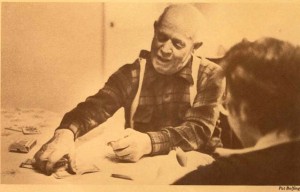 (Image of Mr. Shorty Berta by photographer Pat Bolfing.)
(Image of Mr. Shorty Berta by photographer Pat Bolfing.)
“…while Berta works his farm in vegetables and
salt air as he’s done each spring for fifty seasons,
last of the old time truck farmers
Last of the good green growers,
looking like a dream in his field—
a farmer, a man of the earth,
a seed planting seeds….
from ‘Evening Drive’ by Ron Federighi
You can usually see him working around his truck farm when you drive on Highway 92 into Half Moon Bay. Sometimes he is working in the stand selling the vegetables he has grown. Most often, he is in the fields. Occasionally, you can see him atop the tractor he calls ‘capterpillar.’ He still works very hard aside from the fact that he believes he has become lazy, waking up at 7 a.m. to start his day. He is usually dressed the same: work pants, flannel shirt, suspenders and rubber boots with lots of dirt from hard work thrown in. All these facts seem unimportant unless you know that Guiseppe is eighty-seven-years-old.
No one knows him as Giuseppe. He is Shorty to his many friends. His face is wrinkled and his hair sparse, but his eyes have the glow of eternal youth. He has a sly sense of humor and his keen wit was ever-present as he related to us the experiences of his life.
As we entered the Berta’s small, spotless home, Shorty was seated at the table shuffling a deck of cards. He asked us if we would like to play with him and how much money we had to lose. We agreed to play at a later date. He moved into the small, comfortable living room and sat back in his recliner.
We were nervous on this, our first interview, but once he began talking, things naturally fell into place. He spoke mostly of past days with his sly sense of humor and no remorse.
“I been in California since nineteen fo’teen. I came to dis country, I was twenty fo’ years old.
“I was a farmer back dere in in Italia too. My father was a farmer too. And when I came hea’ I thought I could make mo’ money to go aroun’ work in a mine, logging camp, stuff like dat. I try try six yea’. I go aroun’ work fo’ years in de mine.
“Den I go, ah, in a farm. I peek grape by de ton, we go make mo’ money. But den afta six yea’ was still broke. I say, ‘My God, I’m gonna buy a farm’
“I went over der to Moss Beach. I buy stock ova der in a truck farm. I work fo’ yea’ ova der. Den we’re gonna make good, an’ de boss, he steal all. He keep all fo’ himself. I stay der from nineteen twenny to nineteen twenny to nineteen twenny fo’. Den I start a argument. I sell out. I say, ‘I need a rest. I’m gonna be de boss, an’ nobody’s ticket.’ Den, I rent dis place, for twenny five yea. Den in nineteen fo-ty eight, I got married. Den I buy fo’teen acre.”
Shorty’s conversation included much talk of the old days and what it was like working on a ranch during his first few years in this country.
“At dat time you work in a ranch, a dolla’-a-day. Dey pay your room an’ board, but dey put you to sleep in de, ah, stable, in a bunkhouse. My doggie has better place now den I had back den. We hadda work an’ go to de bathroom outside. We had no electric. Dey give you a lamp, Dey give you a lamp, you put in light fuel, but I like it.
“First place I work was in Stro’berry Lake. I work der’ fo’ two an’ a half days. We work pretty hard, but when I go eat, son of a gun! Der was a steak dat long. (He indicates two feet with his hands.) I thought it was a sin to get mo’, maybe dey come afta’ me, der be none in the mo’ning. I hadda friend of mine, he was in dis country about a yea’, an’ he says, ‘Sit down, get it off.’ (He whispers animatedly.) An’ when we eat dat steak, de guy, de cook, he still bring mo’. An’ in de’ mo’ning, he bring de ham an’ eggs, you know. Big piece of ham, an’ he put it on a big table we had, an’ some people, dey take half a dozen eggs. Dey eat like der was no end, an’ den when det was no mo’, he go an’ fill the plate up.
“But sleep, sleep was bad. For sleep, we had de bunkhouse. You know, one guy, he sleeps here and the other guy, he sleep above, three full. But we had jus’a two-inch board. No mattress, no nothing. We just had one blanket, yeah, an’ dose boards were jus’ like dey come from de mill. We got chinks (splinters). Yeah! I don’ care to sleep dat way.
“You have no cold ’cause dey have big stove, you know, an’ all kinds of wood, an’ we put wood in der too. But in November it started to rain, an’ den we had to quit. But it was all right for eat. Boy, it was all right.”
We kidded Shorty about his interest in food and his desire for life’s little luxuries.
“I like now betta. When I come hea’ we have no inside bathroom. Shower–for shower you had to take outside. I like now.
“When I come to dis country, I like right away. When I land in New Yo’k to San Francisco. It take seven day at dat time, but, ah, in Italy I put in two yea’ service in de army an’ was on de train every day. But in dat train, de seat was a two by fo’, you know,. When I land in New Yo’k, I take de train to San Francisco, the seat was like a centipede. The night car man, he had a big pile of–what you call? Pillows, nice an’ clean. An, he give you, everybody a pillow an’ you sleep betta’ den baby. I like. Den I fin’ de steak mo’ big. Back in Italy, was a steak about dat big and dat long. (He indicates about two inches in thickness and three inches in length.) But ova’ hea’, Jeesus Christ! De steak was like dis! (He indicates two feet in length.) Dey got a pretty good size steak. You be su’prised.”
We asked Shorty if he liked life today better than when he was younger.
“I liked some t’ings betta’ in my day. But, ah, de other t’ings mo’bett’ now. De money, befo’ you make a dolla-a-day. But, den today people have mo’ of de money and dey got mo’ money to spend.
“I remember when I was young. I was by myself at de time. I would go to San Francisco. Den, I go down with twenny dolla’. I stay three, fo’ day, eat an’ sleep, go to dance, an’ take some money home, too.
“Now, I go into the city, me an’ my wife, with twenny dolla’. We go eat, der just enough for one meal.
“When I come to dis country, I have an Italian suit. I was flat broke. I din’ have two cents in my pocket. Den one day, when I make thirty dolla’, I buy myself a new suit, shoes, an’ a shirt for thirty dolla’. Now fo’ the thirty dolla’, you couldn’t buy nothing. Just las’ yea’ I wen’ down an’ bought a coat. Jus’ a big coat, an’ it cos’ me eighty dolla’.
“One t’ing I don’ like. Da people befo’ dey was mo’ friendly. Like mo’ one another. Yeah, mo’ like a family. Da people den was mo’ friendly. Like in a ranch. You have New Year an’ Easta’ Sunday, an stuff like dat, an’ we come togetha’ an’ eat, an’ den we stay all day togetha’. We hadda guy, he hadda accordion an’ we had music, an’ we dance all day. We sing. We drink wine.
Continue reading “HMB Heart & Soul: Shorty Berta: Man of the Earth”
And We have a winner
Remember my contest…for the best new name that describes what the financial talking heads are calling a depression.
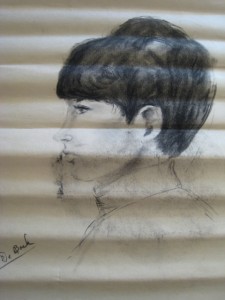 The winner is Lynn Kalajian McCloskey and the winning words are:
The winner is Lynn Kalajian McCloskey and the winning words are:
FESTERING ECONOMY
I can almost reach out and touch it.
Also, please check out this arty website, Polyvore, click here
You could visit Pigeon Point
But take the book with you
———
The other day I took an out-of-town friend to a couple of small Coastside retail nurseries. We visited Flora Farm in Half Moon Bay and got lost in the gardens. We were seeking escape from all the horrific things going on that we have no control over. Lunch at Sam’s Chowder House was good–Sam’s is the former location of Ida’s Seafood, a famous restaurant that moved from Princeton to the Highway 1 location—overlooking the sandy beach and harbor, with the landmark, Pillar Point, watching over everything. Sam’s has taken all the positives and turned it into a lovely venue.
Who can resist sitting outside on a gorgeous Coastside day?
Along the way, we saw a group of Vietnamese Buddhist nuns! They were serene, beatific. I see their gentle smiles in my mind.
We stopped in at Blue Sky Nursery; the place was buzzing, there wasn’t a table to be had in the small cafe. My artist-friend Carol, who was wearing a cook’s apron, is working there now.
My out-of-town friend loved the mini-tour, and I promised to show her more of my Coastside next time.
———
About the old, faded green hippie bus: I saw it parked off Highway 1, on an empty lot in Miramar. There was netting around the bus. I said to myself: I’ve got a picture of that. Well, I never did, and yesterday, my pal, Leon, told me that the bus was just leaving town. He was disappointed that I hadn’t caught up with the folks who drove the bus away.
1938 Was NOT A Very Good Year..
There was the highest unemployment EVER in US History (Burt tells me.) The stock market was at an all time low.
As grim as things were economically, there were always folks who could afford the glamorous flight to the South Seas aboard the famous Pan Am Clipper Ship, headquartered in San Francisco.
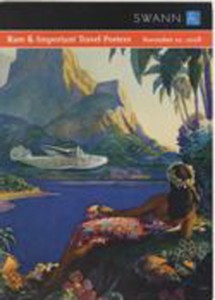
For info on the1938 illustration by Paul George Lawler (Swann Auction Galleries) please click here
An Asian Site Has Linked To Memories & The E.G Observer
I am so flattered. An Asian blogger visited Half Moon Bay and took photos of the El Granada Observer’s favorite places.
Come see!
Please click here
Third Party? See Ted on Carmel Ave
What does “Depression” Mean?
What does Depression Mean?
Even the word is hopelessly antiquated. Like from another century. Definitely “Pre-Laptop.” Ok?
“Depression.” All day long, on the financial networks, “they” call it that, the Depression, the horrific (there is no exact word for it in the American language) third act of what may become the biggest financial crisis ever .
The 1929 Depression.
“Depression?”
To people of our generation , well, you know what we mean by “depression.” What is best known as the biggest horrific financial crisis, ’29, went from being called the “Depression” to a melancholy state of mind that we can remedy with a pill.
This is the 21st Century. Please provide a better name for the biggest financial crisis (ever?)
Possible suggestions include:
Holocaust? No.
Cataclysm? No
Catastrophe? No.
All tired.
Whomever comes up with the best name will win either June’s book “Princeton By the Sea,”or Burt’s book, “Bagels, Barry Bonds and Rotten Politicans.”
———
Rumor: World Central Bank Announcement coming Sunday night?
Email me: [email protected]
—————-
My friend Lynn suggested
“we’re in a dimple.”
I told her “that’s too sweet.”
She said: “I’ll think of something meaner.How about ‘bloodletting’.”
I said “Bloodletting. I like that but I need an adjective in front of it.”
Lynn reminded me that John Stewart called the “Depression of ’08” a “cluster-you can imagine the next word yourself.”
